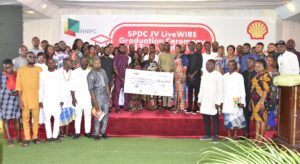
Rainfall will sustain hydro-power generation — NiMet
The Nigerian Meteorological Agency has disclosed that the expected rainfall in most parts of the country would help to sustain hydro-power generation if the opportunity is properly harnessed by the hydro-power generating plant operators.
NiMet, in a document titled “Seasonal Climate Prediction 2023” sighted by our correspondent in Abuja, urged plant managers to complement the non-renewable energy sources to meet up with the high demand for power for cooling systems during the hot season.
The Director General, NiMet, Prof Mansur Matazu, said alternative power generation sources should be embraced to complement the hydro-power sources to cope with the high demand for power, adding that this would also help to hedge the power sector against the vulnerability of hydropower systems to climate variability and change.
Matazu also noted that higher capacity distribution substations should be provided to compensate for the eventual breakdown of existing transformers due to high load and demand, especially in high-density areas.
He said, “Electricity distribution companies should ensure that cables, electric poles, and other installations used in transmitting power to users are properly installed so as to withstand strong winds, heavy rains and other severe weather phenomena.
“Continuous investment in renewable energy systems powered by solar and wind to supplement the non-renewable energy production deficit. Offices, buildings, and households should be well-ventilated to allow effective and efficient air circulation during the hot season, and thereby, reduce demand for power for air-conditioning.
“Regular monitoring and de-silting of hydro-power dams to maximise water storage, prevent dam collapse and minimise the risk of water shortage.”
He, however, noted that maintenance and cleaning of solar panels and windmills would enhance energy production and withstand rainstorms common at the beginning of the rainy season.
He added that power storage battery bank shelters (especially outdoors) for renewable energy sources should be built using non-conductor materials and should be well-ventilated to minimise high-temperature effects.
“Risk of fire incident is also high during the period and, therefore, bushes should be trimmed, and fire breaks provided around power substations and wooden poles.”
Meanwhile, the Nigerian Meteorological Agency has urged the Federal Ministry of Works and the state Ministry of Works to fortify weak roads and bridges on highways warping when the temperatures are extremely high.
The NiMet DG noted that vehicle tyres could be affected by high temperatures, especially during the hot season, adding that it can increase the likelihood of tyre bursts and vehicular accidents.
He further advised the Federal Government to dualise all major expressways to reduce the prospects of traffic jams, reduce visibility, and road congestion during heavy rain.
“Motorists are advised to avoid using expired tyres as these are susceptible to bursting under high pre-surfaces during the hot season.
“Warmer temperatures coupled with heavy rains will affect bituminous and concrete road surfaces as they would crack, allowing rain into the cracks, which can cause fast and accelerate deterioration of road surfaces.



